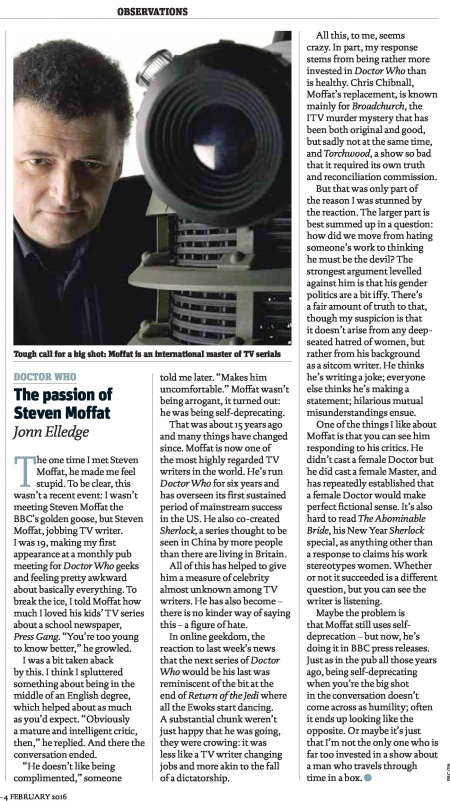The passion of Steven Moffat
- Publication: New Statesman
- Date: 2016-01-29
- Author: Jonn Elledge
- Page: 14
- Language: English
The one time I met Steven Moffat, he made me feel stupid. To be clear, this wasn't a recent event: I wasn't meeting Steven Moffat the BBC's golden goose, but Steven Moffat, jobbing TV writer. I was 19, making my first appearance at a monthly pub meeting for Doctor Who geeks and feeling pretty awkward about basically everything. To break the ice, I told Moffat how much I loved his kids' TV series about a school newspaper, Press Gang. "You're too young to know better," he growled.
I was a bit taken aback by this. I think I spluttered something about being in the middle of an English degree, which helped about as much as you'd expect. "Obviously a mature and intelligent critic, then," he replied. And there the conversation ended.
"He doesn't like being complimented," someone told me later. "Makes him uncomfortable." Moffat wasn't being arrogant, it turned out: he was being self-deprecating.
That was about 15 years ago and many things have changed since. Moffat is now one of the most highly regarded TV writers in the world. He's run Doctor Who for six years and has overseen its first sustained period of mainstream success in the US. He also co-created Sherlock, a series thought to be seen in China by more people than there are living in Britain.
All of this has helped to give him a measure of celebrity almost unknown among TV writers. He has also become – there is no kinder way of saying this – a figure of hate.
In online geekdom, the reaction to last week's news that the next series of Doctor Who would be his last was reminiscent of the bit at the end of Return of the Jedi where all the Ewoks start dancing. A substantial chunk weren't just happy that he was going, they were crowing: it was less like a TV writer changing jobs and more akin to the fall of a dictatorship.
All this, to me, seems crazy. In part, my response stems from being rather more invested in Doctor Who than is healthy. Chris Chibnall, Moffat's replacement, is known mainly for Broadchurch, the ITV murder mystery that has been both original and good, but sadly not at the same time, and Torchwood, a show so bad that it required its own truth and reconciliation commission.
But that was only part of the reason I was stunned by the reaction. The larger part is best summed up in a question: how did we move from hating someone's work to thinking he must be the devil? The strongest argument levelled against him is that his gender politics are a bit iffy. There's a fair amount of truth to that, though my suspicion is that it doesn't arise from any deep-seated hatred of women, but rather from his background as a sitcom writer. He thinks he's writing a joke; everyone else thinks he's making a statement; hilarious mutual misunderstandings ensue.
One of the things I like about Moffat is that you can see him responding to his critics. He didn't cast a female Doctor but he did cast a female Master, and has repeatedly established that a female Doctor would make perfect fictional sense. It's also hard to read The Abominable Bride, his New Year Sherlock special, as anything other than a response to claims his work stereotypes women. Whether or not it succeeded is a different question, but you can see the writer is listening.
Maybe the problem is that Moffat still uses self-deprecation – but now, he's doing it in BBC press releases. Just as in the pub all those years ago, being self-deprecating when you're the big shot in the conversation doesn't come across as humility; often it ends up looking like the opposite. Or maybe it's just that I'm not the only one who is far too invested in a show about a man who travels through time in a box.
Caption: Tough call for a big shot: Moffat is an international master of TV serials
Disclaimer: These citations are created on-the-fly using primitive parsing techniques. You should double-check all citations. Send feedback to whovian@cuttingsarchive.org
- APA 6th ed.: Elledge, Jonn (2016-01-29). The passion of Steven Moffat. New Statesman p. 14.
- MLA 7th ed.: Elledge, Jonn. "The passion of Steven Moffat." New Statesman [add city] 2016-01-29, 14. Print.
- Chicago 15th ed.: Elledge, Jonn. "The passion of Steven Moffat." New Statesman, edition, sec., 2016-01-29
- Turabian: Elledge, Jonn. "The passion of Steven Moffat." New Statesman, 2016-01-29, section, 14 edition.
- Wikipedia (this article): <ref>{{cite news| title=The passion of Steven Moffat | url=http://cuttingsarchive.org/index.php/The_passion_of_Steven_Moffat | work=New Statesman | pages=14 | date=2016-01-29 | via=Doctor Who Cuttings Archive | accessdate=27 February 2026 }}</ref>
- Wikipedia (this page): <ref>{{cite web | title=The passion of Steven Moffat | url=http://cuttingsarchive.org/index.php/The_passion_of_Steven_Moffat | work=Doctor Who Cuttings Archive | accessdate=27 February 2026}}</ref>
